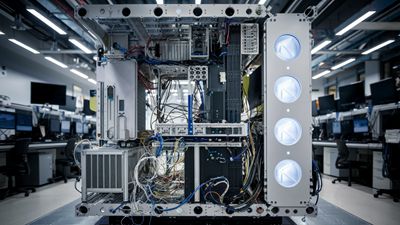NetEase Stock Drops: What’s Behind the Decline and How Other Chinese Stocks Fared
On August 22, 2024, NetEase’s stock experienced a significant drop due to disappointing second-quarter profit figures, despite a notable increase in gaming revenue. This report delves into the reasons behind NetEase’s stock decline, evaluates the performance of other major Chinese stocks on the same day, and provides actionable insights for investors.
Introduction
NetEase’s Second-Quarter Performance
Financial Overview
NetEase reported a net income of RMB 6.8 billion (approximately $952 million) for the second quarter of 2024, representing a 17% decline year-over-year. This figure fell short of analysts’ expectations, contributing to the stock’s decline. The company’s revenue for the quarter was RMB 25.5 billion (around $3.6 billion), marking a 6.1% increase year-over-year but still below projections.
Gaming Revenue
Despite the disappointing profit figures, NetEase’s gaming and related value-added services revenue increased by 6.7% to RMB 20.1 billion (about $2.8 billion). Notable games such as “Naraka: Bladepoint” and “Identity V” saw record daily active users (DAUs) around their anniversary periods. CEO William Ding emphasized the company’s commitment to innovation and expanding its gaming portfolio globally.
Segment Performance
- Games and Related Services: Revenues of RMB 20.1 billion (US$2.8 billion), a 6.7% increase year-over-year but a drop from RMB 21.5 billion in the previous quarter.
- Youdao: Revenues of RMB 1.3 billion (US$181.9 million), an increase of 9.5% year-over-year but a decrease from RMB 1.4 billion in the prior quarter.
- Cloud Music: Revenues remained stable at RMB 2.0 billion (US$280.8 million).
Gross Profit and Operating Expenses
NetEase’s gross profit was recorded at RMB 16.0 billion (US$2.2 billion), an 11.6% increase from the same quarter in 2023 but a decline from RMB 17.0 billion in the previous quarter. The overall operating expenses increased by 8.9% year-over-year to RMB 9.0 billion (US$1.2 billion), primarily due to R&D and marketing investments.
Reasons Behind NetEase’s Stock Drop
Profit Miss and Revenue Shortfall
The primary reason for NetEase’s stock drop was the weaker-than-expected profit figures. The net income of RMB 6.8 billion fell short of analysts’ expectations, leading to a negative market reaction. Additionally, the revenue of RMB 25.5 billion, although a 6.1% year-over-year increase, was still below projections, further contributing to the stock’s decline.
Decline in Key Segments
While gaming revenue saw a year-over-year increase, it declined from the previous quarter. This decline in key segments, coupled with the overall decrease in net income, raised concerns among investors about the company’s growth trajectory.
Market Sentiment
The broader market sentiment also played a role in NetEase’s stock drop. Despite the company’s efforts to innovate and expand its gaming portfolio, the mixed financial results and the decline in net income overshadowed these positive developments, leading to a negative market reaction.
Performance of Other Major Chinese Stocks
Alibaba Group (NYSE: BABA) and JD.com (JD)
On the same day, Alibaba Group and JD.com experienced declines of 0.68% and 1.41%, respectively. Despite these drops, both companies are highlighted as potential investment opportunities due to their low valuations and strong growth potential. Alibaba’s market capitalization stood at $178 billion, with its current price at $82.96.
Resilience of Chinese Equities
Despite weaker-than-expected economic activity, Chinese equities demonstrated resilience. The Shanghai Composite Index and the blue-chip CSI 300 both reported gains, indicating positive sentiment in the broader market. This resilience is particularly beneficial for growth companies with high insider ownership, as it often indicates strong confidence from those closely associated with the business.
Notable Growth Companies
Several Chinese growth companies with high insider ownership showed strong performance, including:
- ShenZhen Woer Heat-Shrinkable Material Ltd (SZSE:002130) – Insider Ownership: 19%, Earnings Growth: 28.7%
- Ningbo Sunrise Elc Technology Ltd (SZSE:002937) – Insider Ownership: 24.3%, Earnings Growth: 27.7%
- Arctech Solar Holding (SHSE:688408) – Insider Ownership: 38.7%, Earnings Growth: 26.9%
These companies are noted for their significant growth potential and strong insider ownership, indicating a positive outlook for investors.
Actionable Insights and Recommendations
Diversify Investments
Investors should consider diversifying their portfolios to mitigate risks associated with individual stock performance. While NetEase’s stock drop may be concerning, the broader Chinese market shows resilience, and there are opportunities in other growth companies with strong insider ownership.
Focus on Growth Sectors
Investors should focus on growth sectors such as technology, healthcare, and consumer goods. Companies like Alibaba and JD.com, despite their recent declines, present compelling buying opportunities due to their low valuations and strong growth potential.
Monitor Economic Indicators
Investors should closely monitor economic indicators and market sentiment. The broader economic environment in China, including factors such as youth unemployment and luxury goods demand, can impact stock performance. Staying informed about these trends can help investors make more informed decisions.
Evaluate Company Fundamentals
Investors should evaluate the fundamentals of companies before making investment decisions. For NetEase, despite the recent profit miss, the company’s commitment to innovation and its strong gaming portfolio are positive indicators. Investors should consider these factors alongside financial performance when making investment decisions.
Consider Long-Term Potential
Investors should consider the long-term potential of their investments. While short-term fluctuations can be concerning, companies with strong growth potential and solid fundamentals are likely to perform well in the long run. NetEase’s focus on innovation and global expansion in gaming, for example, could drive future growth.
Conclusion
NetEase’s stock drop on August 22, 2024, was primarily driven by disappointing profit figures and a revenue shortfall. Despite these challenges, the company’s gaming segment showed positive growth, and its commitment to innovation remains strong. The broader Chinese market demonstrated resilience, with several growth companies showing strong performance.
Investors should consider diversifying their portfolios, focusing on growth sectors, and evaluating company fundamentals. By staying informed about economic indicators and considering the long-term potential of their investments, investors can navigate the complexities of the Chinese stock market and make informed decisions.
In summary, while NetEase’s recent performance may raise concerns, the broader market presents opportunities for growth and investment. By adopting a strategic and informed approach, investors can capitalize on these opportunities and achieve their investment goals.


